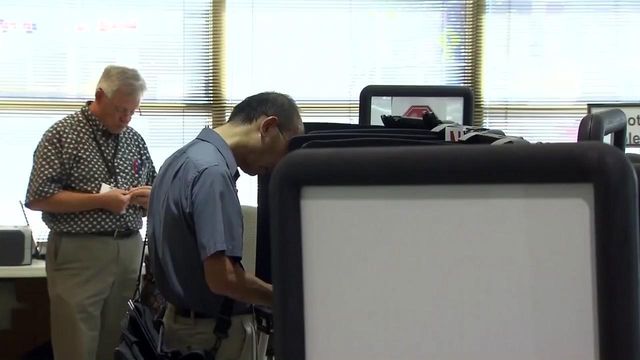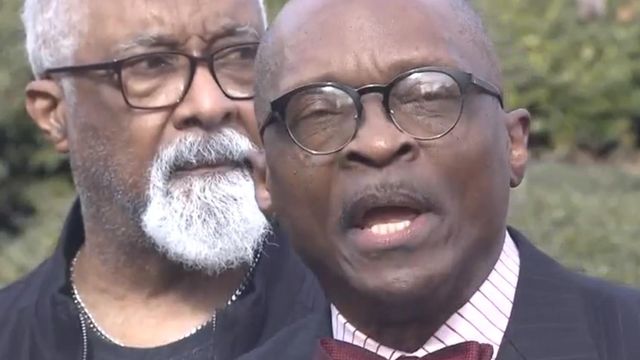Federal court to block NC's voter ID requirement before 2020 elections
A federal court said it will, at least temporarily, block the state from requiring photo ID at the polls in the coming elections
Posted — UpdatedU.S. District Judge Loretta Biggs, a President Barack Obama appointee, is presiding in the case, which was filed in North Carolina's Middle District, with hearings in Winston-Salem.
"The court gave advance notice that it will rule with plaintiffs and preliminarily enjoin the photo voter ID law next week," Caitlin Swain, an attorney for the plaintiffs, said in a Friday morning email to WRAL News. "We are awaiting the full order, gratified that the court is intervening to prevent this discriminatory law from impeding North Carolinians' equal access to the ballot."
At a press conference Friday, state NAACP President Rev. T. Anthony Spearman said his team was "ecstatic" about the development. He balled up a voter ID explainer pamphlet and urged people to throw them away.
The decision can be appealed. The State Board of Elections had opposed the injunction, which was requested in September.
Republican legislative leaders, who have defended against other election law challenges, aren't part of this case, though. Biggs rejected their attempts to get more heavily involved in November, saying the state board had shown a willingness to defend the law's constitutionality.
Board spokesman Patrick Gannon said Friday morning that it's up to Attorney General Josh Stein how to proceed mpw, unless the board itself votes to take a position. He also said legislative leadership could attempt an appeal.
Stein spokeswoman Laura Brewer said the Attorney General's Office would wait to review the full order next week before deciding what to do. House Speaker Tim Moore called on the electons board, which the governor appoints, to appeal "this last-minute attempt by an activist federal judge to overturn the will of North Carolina voters."
"To issue an injunction against one of the nation’s most lenient voter ID laws – which 34 states already have – without providing an opinion is an outrageous affront to due process, the rights of North Carolina voters and the rule of law," Moore said in an emailed statement.
Other legislative Republicans struck a similar chord, calling on Stein or the elections board to fight the injunction. House Rules Chairman David Lewis said in a text that the General Assembly will also "explore additional options to ensure that the people's vote for voter ID is respected."
Speaking for Senate Republicans, Sens. Warren Daniel, R-Burke, and Joyce Krawiec, R-Forsyth, said in a statement that the judge's decision suppresses the votes of 2 million people who voted for the amendment.
Those voters had not seen the more detailed rules when they voted for the amendment, though. Republicans rushed to pass them shortly after the 2018 elections and before a newly elected General Assembly – one without a veto-proof GOP majority – took office.
The law was set to go into effect with next year's elections, and it would also expand the number of poll watchers allowed and loosen requirements for vote challenges. The NAACP branches said the law violates both the 14th and 15th amendments to the U.S. Constitution, as well as Section 2 of the U.S. Voting Rights Act and that it's a "barely disguised duplicate" of the 2013 voter ID law, which the 4th U.S. Circuit Court of Appeals found discriminatory.
This version, laid out in Senate Bill 824, "carries the same discriminatory intent as its predecessor, and likewise fails to remedy its racially disparate impacts," the branches said in their injunction filing. NAACP attorney Irving Joyner said during Friday's press conference that the lawsuit targeted the bill, not the constitutional amendment, but the amendment "will be on our agenda next."
The state board, represented by the Attorney General's Office, said in a filing opposing the injunction earlier this year that there are "important distinctions" between the 2018 and 2013 laws.
"First, under the prior law, county boards did not issue free IDs," the state argued in that motion.
The new law also has a "much broader" reasonable impediment rule than the previous version, the state argued.
Daniel and Krawiec, who co-sponsored the 2018 bill, said it "provides more ways to comply with the ID requirement than almost any state in the country, including issuing free IDs."
Related Topics
• Credits
Copyright 2024 by Capitol Broadcasting Company. All rights reserved. This material may not be published, broadcast, rewritten or redistributed.






